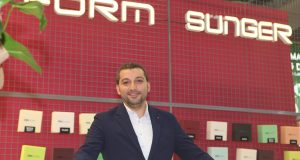 Interview with Georg Dieners, General Secretary of the OEKO-TEX® Association
Interview with Georg Dieners, General Secretary of the OEKO-TEX® Association
ZURICH – Since the start of the year, Georg Dieners has been the General Secretary of the International OEKO-TEX® Association based in Zurich (Switzerland). The association of 16 independent textile research and test institutes has been performing harmful substance testing according to the OEKO-TEX® Standard 100 since 1992. Other services offered by OEKO-TEX® include STeP (Sustainable Textile Production), a certification system for sustainable textile production, and the “Made in Green” product label. The Association has also launched the MySTeP database so companies can map their individual supply chains and receive support in establishing more sustainable sourcing.
We talked to Georg Dieners about his first months in office and the challenges faced by the textile industry.
In the past, OEKO-TEX® was synonymous with the OEKO-TEX® Standard 100 and its “Confidence in Textiles” label, for companies in the textile industry as well as retailers and consumers. What steps has OEKO-TEX® taken to continue the development of its existing services and supplement them with new products?
Over its history, OEKO-TEX® has continuously added certification systems to its product portfolio. For instance, we have been auditing production facilities with regard to environmental compatibility and social standards since 1995. In that respect, our international institutes have decades of experience in the area of sustainability. We have been able to utilize that experience, combined with feedback from the market, for enhancements and additions to our overall system now consisting of the OEKO-TEX® Standard 100, STeP, Made in Green, and MySTeP. We are able to offer our customers a comprehensive and practical solution to the ever-increasing requirements of the textile industry.
What are the specific challenges faced by manufacturers, brands, and retailers?
Politicians, the media, and NGOs are pushing for changes in textile production to make the process more socially responsible and environmentally friendly. Consumers themselves are much more conscious of what they are buying. At the same time, supply relationships are very complex and can span across the whole world. They have to become more transparent to increase the level of confidence throughout the industry.
What are the possible solutions and where do you see the role of OEKO-TEX® within this context?
Our aim is always to ensure safety and, as a result, confidence. The basis for that may be an exclusion list for harmful substances which some companies have established themselves, like a Restricted Substances List (RSL). Likewise, normative provisions at an international level or industry-based commitments can help to achieve this aim. However, in each case it is vital that there is a neutral testing and certification process. That is what the OEKO-TEX® solutions provide. They reduce complexity for the textile industry and offer consumers, the media, and NGOs the necessary level of traceability and transparency
How do you rate national initiatives like the Partnership for Sustainable Textiles in Germany? To make the textile and clothing industry more sustainable, politicians, NGOs, and the companies in the industry all have to pull in the same direction. Since the action plan was modified in April, significant associations and a large number of notable companies from the textile industry have joined the partnership. That is an important step and we welcome it. To continue our support for this multi-stakeholder approach in the future, the international OEKO-TEX® Association is a member of the Textiles Partnership through the OEKO-TEX® Foundation.
To what extent do the OEKO-TEX® certifications cover the objectives of the Partnership for Sustainable Textiles?
We share the central objectives of the Partnership and support the Partnership members in their efforts to achieve continuous improvements to existing processes and working conditions in textile production around the world. With its comprehensive system, OEKO-TEX® covers the full textile production chain and is therefore an important partner in achieving these goals.
Who, specifically, do your various services appeal to?
For manufacturers, quality assurance is paramount, which means harmful substance testing according to the OEKO-TEX® Standard 100 and production facility audits according to STeP. The closer companies are to the end consumer, the more marketing becomes important in addition to quality assurance. The OEKO-TEX® Standard 100 label helps brands and retailers in particular to prove that their products are harmless to human ecology. The label offers consumers an important aid in their decision-making. If a company also wants to prove that a product has been tested for harmful substances and likewise has been produced sustainably, it can do so with the Made in Green label
In your opinion, what are the most important benefits to companies who work with OEKO-TEX®?
OEKO-TEX® has been established at an international level for some time and is extremely prevalent throughout the textile chain. Added to that is the high level of awareness and reputation of our brand, especially with consumers. The individual modules in our testing and certification systems compliment and build upon each other. They are tailored to a whole variety of different needs, from those of manufacturers of raw materials, spinning mills, weaving mills, and finishing facilities to manufacturers of ready-made-clothes, retailers, and brands. Each company can decide which services they want to use. The costs and expenses are then distributed along the production chain, because at each value creation stage, only the value added to the product at that stage is tested in the laboratory
The expansion of the product range also represents an ongoing challenge. What considerations have been given to this and what are the implications you have taken from them?
The most important issue is that the products are clearly positioned and delineated. In our case, the concept behind our range was that the products could build on and interconnect with each other. That allows us to create synergies both for our customers and us. The core of our overall system is and will remain the OEKO-TEX® Standard 100.
How do you intend to pass the positive values of the OEKO-TEX® Standard 100 on to the extended product portfolio?
Our whole system is based on the same values: confidence, independence, and passion for textile products. We take this approach at every stage from product development to communications. The aim here is to pass along our positive image from the harmful substance testing to the whole product family. For us, an important aspect of this is strengthening the “OEKO-TEX®” umbrella brand. We have made it a prominent part of the Made in Green label, along with the “Confidence in Textiles” message. This message provides a perfect summary of what our services stand for: we create confidence in textiles!
Will there also be changes to harmful substance testing based on the OEKO-TEX® Standard 100?
The testing and certification system has proven itself over two decades, and even today the concept behind it is still perfectly suited to the market. Except for the established yearly revision of the test criteria, there won’t be any changes in terms of content. We are, however, critically reviewing the design and language within the actual label at the moment. This is a sensitive area to review because the label is prominent worldwide and enjoys a high level of recognition. We are aware of this and are treating it with due consideration.
What conclusions have you come to after six months in office?
We are on the right path. The market feedback is positive and the number of certifications is increasing steadily. Our systems are meeting today’s requirements. Sustainability at all levels is a massive trend of the 21st century, and our new services help our customers achieve more sustainable levels than ever before. That helps us, and our customers, become better equipped for the challenges of the future.
 SleepTech Magazine Mattress, Accessories, Machinery, Raw Materials
SleepTech Magazine Mattress, Accessories, Machinery, Raw Materials


